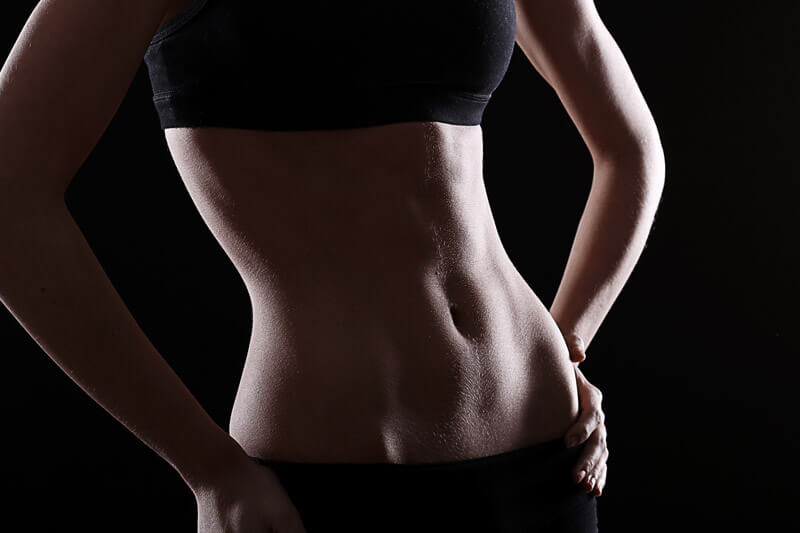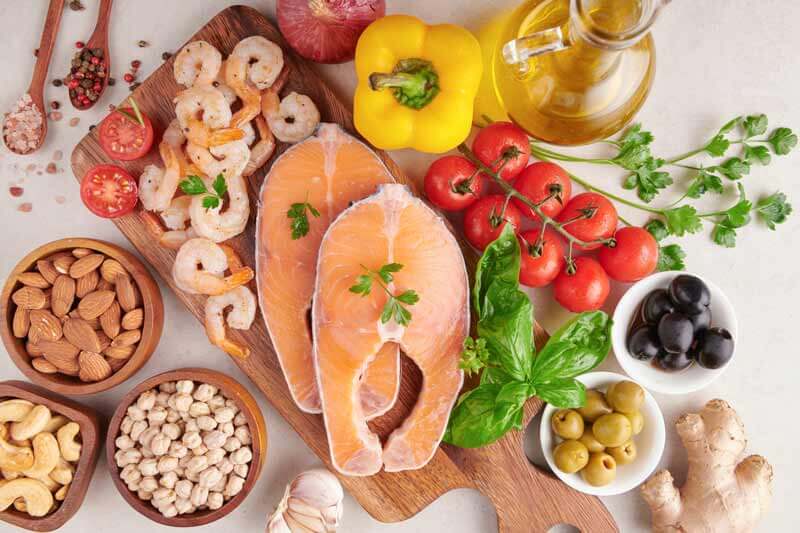When you’ve been working hard to feel your best, there’s nothing worse than some serious bloating ruining the look of your favorite outfit. Or even worse, knocking your confidence!
However, if you’ve ever experienced feeling bloated, you know that it can mess up your training and everyday life! Bloating can be uncomfortable, distracting, and in some instances, a symptom of an illness or food sensitivity or intolerance.
If you regularly feel bloated, you’re not alone, as bloating is one of the most common gastrointestinal complaints in the United States, with an estimated 20% of Americans suffering every week. While you may not be able to avoid bloating completely, your stomach might benefit either from some new eating habits or from speaking to your doctor.
What causes bloating?

Bloating refers to fullness, pressure, or gassiness in your stomach. When there’s a visible expansion of the abdomen, distension can often occur alongside bloating but is a separate issue.
Several factors could be causing bloating, from your eating habits to the microbes that live in your gut. Even things like the location and timing of your bloating or any other symptoms can offer insight into what’s causing your bloating.
Speed eating and swallowing air
If you regularly eat on the go, you’re likely taking great big gulps of air with every bite and causing you to swallow a large amount of air. This can also happen if you eat large meals, eat irregularly, or drink a lot of carbonated drinks.
Also Read: Five belly toning exercises to do after losing weight
Swallowed air is usually expelled before it reaches your intestines through burping, which is where it could cause bloating. So, if you’re noticing that you’re belching a lot after food and then feeling bloated a few hours later, slowing down to eat might make you feel better.
Gas from your gut microbes
Did you know that your gut is full of trillions of microbes? Their primary function is to produce energy via carbohydrate fermentation, resulting in gas production. Some carbs are more fermentable than others, leading to more gas than others.
Constipation
Gas isn’t always the cause of bloating; sometimes, it’s down to infrequent or incomplete bowel movements. Like bloating, constipation can be caused by a range of factors, from inadequate fiber intake, pelvic floor dysfunction or even stress.
Bowel disease
If you’re chronically suffering from bloating, it can be a symptom of bowel diseases such as Irritable Bowel Syndrome (IBS), Inflammatory Bowel Disease (IBD), or Celiac Disease.
The causes are still largely unknown; however, researchers believe these bowel diseases could be caused by abnormal contractions of the gut wall, imbalanced gut microbes, an altered nervous system, or a combination of these factors.
What foods can cause bloating?

If you’ve been searching for ways to manage feeling bloating, you’ve probably come across the term: low-FODMAP. FODMAP is fermentable oligo-, di-, and monosaccharides and polyols.
We lack the digestive enzymes required to break down most FODMAP carbs for absorption, so they pass through the small intestine mostly intact before reaching the large intestine and gut microbes then ferment them. These carbs can also attract water into the gut, leading to bloating and loose bowel movements.
Fruit, vegetables, grains, and beans
Foods high in fiber also tend to be high in FODMAPs. Some of the highest FODMAP foods include:
- Honey
- Milk or other dairy containing lactose
- Garlic
- Onions
- Cauliflower
- Mushrooms
- Artichokes
- Avocados
- Apricots and other pitted fruits
- Apples
- Wheat
- Cashews
- Pistachios
- Beans
- Dried fruits
You don’t want to remove these from your diet entirely because although they might lead to some gas production, they’re also essential sources of energy for your gut microbes and are beneficial for your health.
Protein shakes & bars and diet foods
Some protein shakes & bars, or meal replacement bars, contain ingredients like whey protein concentrate and Inulin, which can cause bloating. Many low-carb, low sugar, or sugar-free products tend to be sweetened with sugar alcohols, creating a laxative effect.
Whey concentrate contains laxatives which can cause GI problems in people who suffer from lactose intolerance. In addition, Inulin is highly fermentable and is considered a prebiotic, which means it’s helpful to microbes and a functional fiber. However, being so fermentable can cause gas and bloat.
Also Read: Does Intermittent fasting help you to shed the pounds?
Sorbitol and xylitol are frequently used sugar alcohols to replace sugar in foods like meal replacement or protein bars, chocolate, syrups, and ice cream. They belong to the P of FODMAPs, polyols.
Should I be worried about bloating?
This depends on how badly the bloating is affecting you. If it’s infrequent, and you think it may be related to something like swallowed air, it’s probably benign.
However, if it’s frequent and so severe that your quality of life is suffering, something else could be going on. If your bloating is accompanied by other symptoms such as frequent diarrhea or constipation, abdominal pain, unintentional weight loss, or bloody stool, it’s time to see your doctor.
How to stop bloating

Unfortunately, there aren’t currently any medications or management options for bloating. Everyone experiences some gas and bloating from time to time; however, if you’ve noticed that your diet or lifestyle might be contributing to your bloating, here are some changes you could make.
Eat at regular times
Waiting to eat until you’re starving is likely to result in you inhaling your food and taking big bites and lots of swallowed air. So, you might find that a regular eating pattern when you’re eating when you’re just hungry rather than famished might help.
Light exercise

If you’re suffering from IBS, bloating, chronic constipation, or other symptoms of GI, then you might find getting some regular light exercise could help reduce some of your symptoms. For example, a light bike ride or a brisk walk.
Eat fiber and drink water
Fiber plays an essential role in our bowel movements, and in some cases, insufficient fiber could be causing your bloating. It’s recommended that women ingest around 25 grams of fiber per day. If you’re not yet hitting this target, increase your fiber intake slowly to prevent any GI distress.
In addition, how hydrated you are can impact your fiber and how it’s broken down. Even moderate dehydration could increase the likelihood of becoming bloated and constipated.
Try a supplement
Many gut health supplements make bold claims. However, a few options are supported by evidence, for example, probiotics and digestive enzymes.
Try low-FODMAP
If you’re struggling with symptoms of IBS or bloating, then trying a low-FODMAP diet is one way to possibly reduce your symptoms; however, it isn’t intended to be a long-term diet or way of life.
The diet involves three phases where you temporarily reduce your FODMAP intake and systematically test your tolerance for each FODMAP group before gradually introducing FODMAPs.
Also Read: 13 scientifically proven ways to lose weight
If you’re interested in a FODMAP diet, seek guidance from a fully trained dietician or nutritionist. Like any restrictive diet, the long-term following of a low-FODMAP diet could make it challenging to reach your nutritional needs.
The conclusion

There are so many potential causes for bloating, and often it’s considered just a normal part of the digestion process. However, it may indicate that something bigger is going on for some, and if you’re experiencing bloating along with other symptoms, then speak to your doctor.
If you’re just feeling a bit uncomfortable, then some changes to your food choices, eating habits and dialing up your water intake could relieve you from bloating.
We know you’ve got this, ladies, but if you need a helping hand, did you know Zotrim can help you feel your best? Our 100% natural ingredients have been carefully selected to help you burn fat, reduce cravings, and boost your metabolism.


















